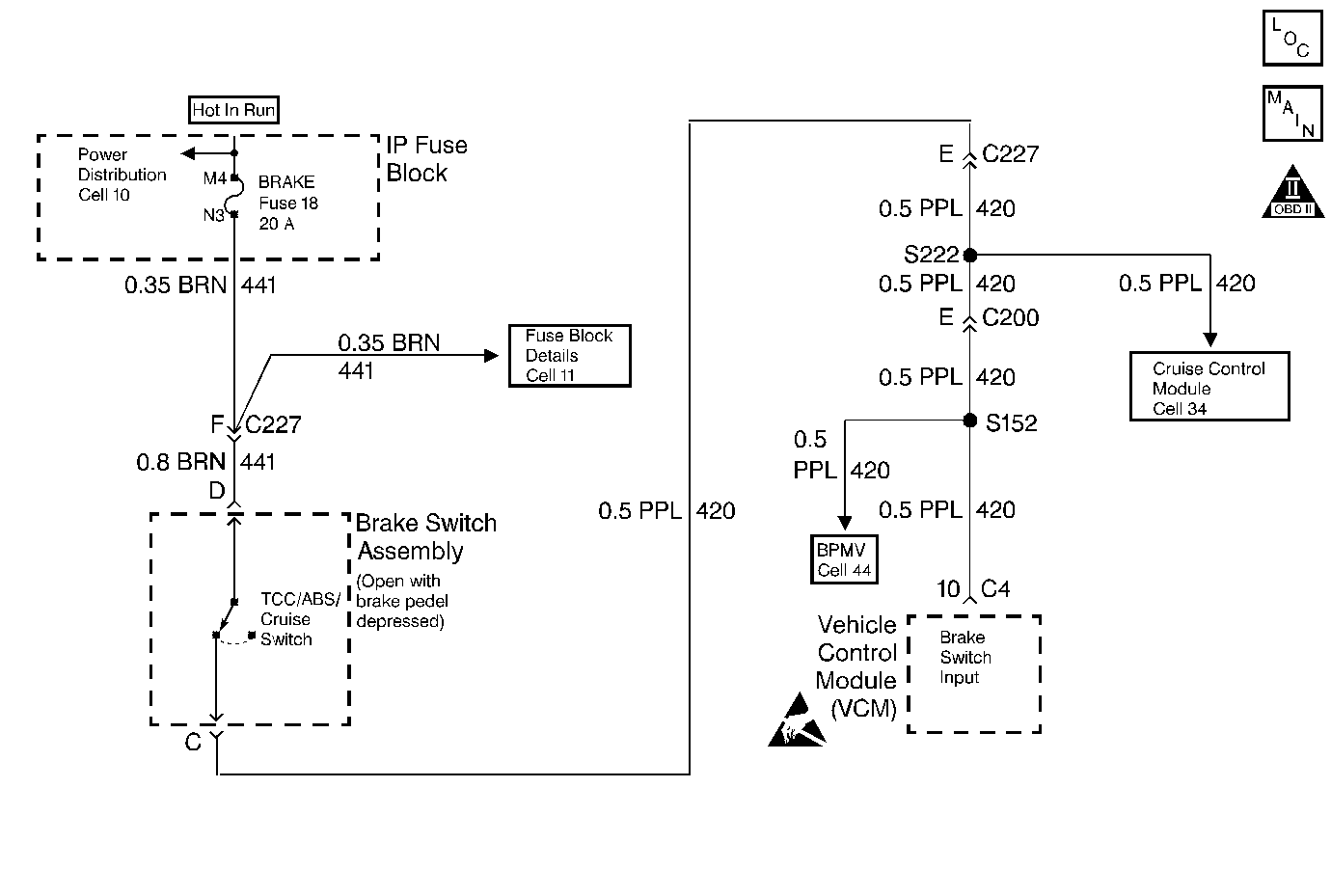
Circuit Description
The brake switch indicates the brake pedal status. The normally-closed brake switch supplies a B+ signal on circuit 420 to the Vehicle Control Module (VCM). The signal voltage circuit opens when the brakes are applied. The VCM uses the open signal voltage circuit in order to de-energize the Torque Converter Clutch Pulse Width Modulation Solenoid Valve (TCC PWM Sol. Valve) when the brakes are applied.
If the VCM detects an open brake switch during accelerations, then DTC P0719 sets. DTC P0719 is a type D DTC. For California emissions vehicles, DTC P0719 is a type B DTC.
Conditions for Setting the DTC
| • | No OSS DTC P0502 |
| • | The VCM detects an open brake switch/circuit (0 volts) for 15 minutes without going closed for 2 seconds. |
| • | The following sequence of events occurs seven consecutive times: |
| - | The vehicle speed is less than 8 km/h (5 mph). |
| - | Then the vehicle speed is 8-32 km/h (5-20 mph) for 3.5 seconds. |
| - | Then the vehicle speed is greater than 32 km/h (20 mph) for 6 seconds. |
| • | DTC P0719 has not passed. |
Action Taken When the DTC Sets
| • | The VCM inhibits fourth gear. |
| • | The VCM freezes shift adapts. |
| • | The VCM illuminates the Malfunction Indicator Lamp (MIL) on California emissions vehicles. |
Conditions for Clearing the DTC
- For California Emissions vehicles, the VCM turns OFF the MIL after three consecutive ignition cycles without a failure reported.
- A scan tool can clear the DTC from the VCM history. The VCM clears the DTC from the VCM history if the vehicle completes 40 warm-up cycles without a failure reported.
- The VCM cancels the DTC default actions when the fault no longer exists and the ignition is OFF long enough in order to power down the VCM.
Diagnostic Aids
| • | Inspect the wiring for poor electrical connections at the VCM. Inspect the wiring for poor electrical connections at the TCC brake switch. Look for the following problems: |
| - | A bent terminal |
| - | A backed out terminal |
| - | A damaged terminal |
| - | Poor terminal tension |
| - | A chafed wire |
| - | A broken wire inside the insulation |
| • | When diagnosing for an intermittent short or open, massage the wiring harness while watching the test equipment for a change. |
| • | Ask about the customer's driving habits and any unusual driving conditions he or she might have, such as stop and go traffic or expressway driving. |
| • | Inspect the brake switch for proper mounting and adjustment. |
| • | Inspect for the most current calibration I.D. and the latest bulletins. |
| • | First diagnose and clear any engine DTCs or TP Sensor codes that are present. Then inspect for any transmission DTCs that may have reset. |
Test Description
The numbers below refer to the step numbers on the diagnostic table.
Step | Action | Value(s) | Yes | No | ||||||
|---|---|---|---|---|---|---|---|---|---|---|
1 | Was the Powertrain On-Board Diagnostic (OBD) System Check performed? | -- | ||||||||
2 |
Important: Before clearing the DTCs, use the scan tool in order to record the Freeze Frame and Failure Records for reference. The Clear Info function will erase the data. Is the test lamp ON? | -- | ||||||||
Install a J 36169-A Fused Jumper Wire between terminals C and D of the brake switch connector. Did the TCC Brake Switch status change from Open to Closed? | -- | |||||||||
4 |
Refer to Electrical Diagnosis, Section 8. Is the fuse open? | -- | ||||||||
5 | Inspect circuit 441 for a short to ground. Refer to Electrical Diagnosis, Section 8. Did you find a problem? | -- | ||||||||
6 | Inspect circuit 420 for a short to ground. Refer to Electrical Diagnosis, Section 8. Did you find a problem? | -- | ||||||||
7 | Replace the brake switch. Refer to Stoplamp Switch Replacement, in Section 5. Is the replacement complete? | -- | -- | |||||||
8 | Inspect circuit 441 for an open. Refer to Electrical Diagnosis, Section 8. Did you find and correct a problem? | -- | -- | |||||||
9 | Inspect circuit 420 for an open. Refer to Electrical Diagnosis, Section 8. Did you find a problem? | -- | ||||||||
10 | Replace the VCM. Refer to VCM Replacement/Programming , Section 6. Is the replacement complete? | -- | -- | |||||||
11 | In order to verify your repair, perform the following procedure:
Has the test run and passed? | -- | System OK |
